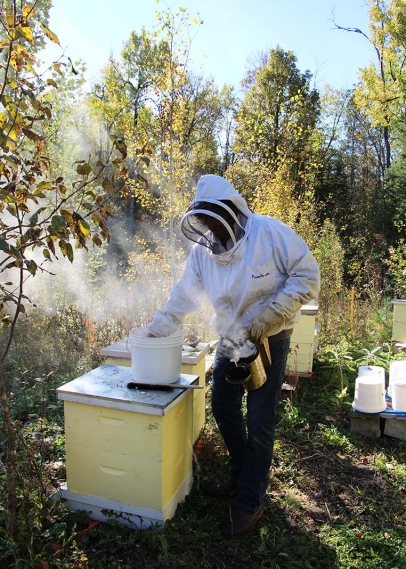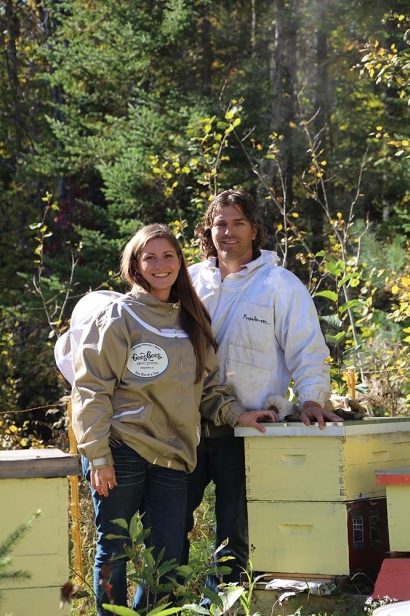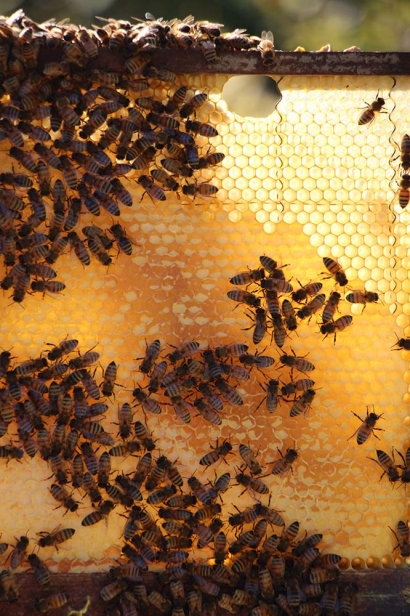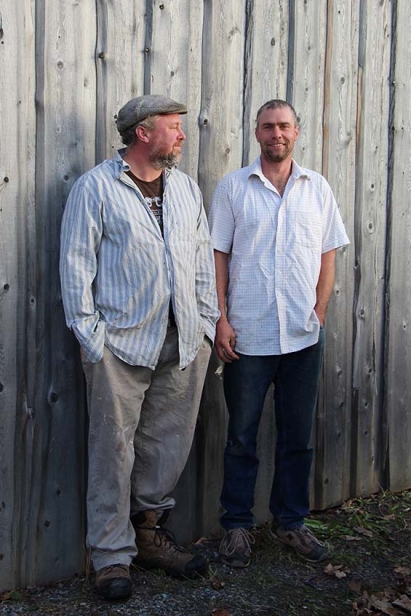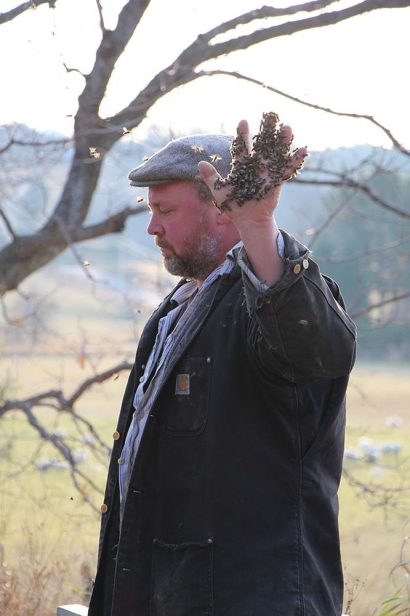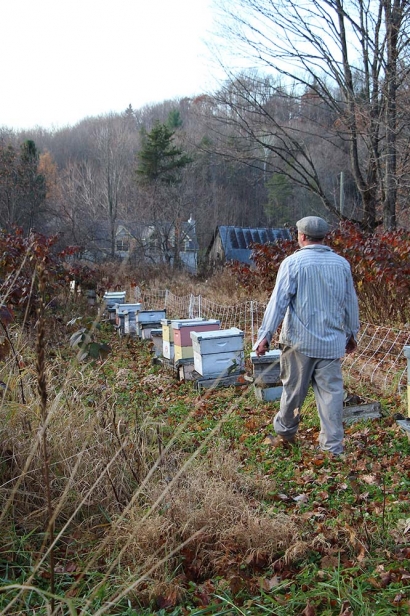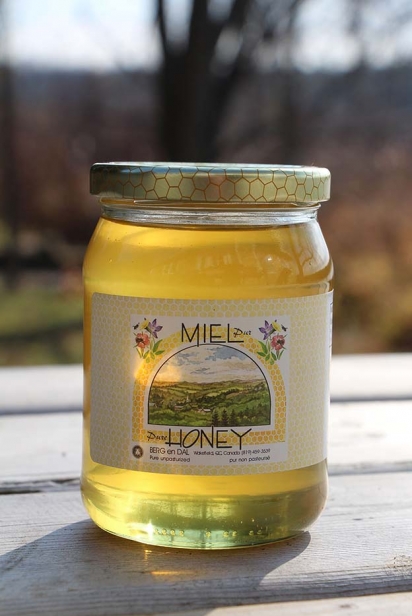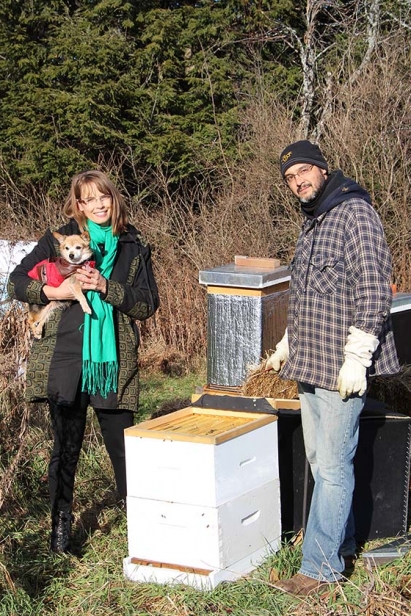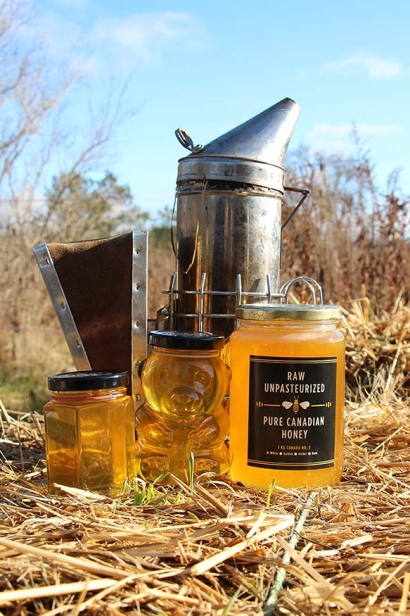Dancing with the Bees
Did you know bees can dance? If the idea of little stripy, furry bottoms wiggling with joy is endearing, then read on. While in fact they dance to let their hive companions know where to find good, plentiful food, bees are the most amazing little creatures, truly worthy of the praise and love that you’ll hear from any beekeeper.
“There are so many special things about bees I could fill a whole book,” says Marianne Gee, the owner, with her husband Matt, of Gees Bees Honey Company, a bee-keeping operation with nearly 100 hives based in Dunrobin, just north and west of Ottawa. “We quickly fell in love with bees when we discovered them living in our first home, and now we get to spread that love to chefs, business owners and families as they discover the magic of honeybees first hand in their own backyard or rooftop. It’s awesome.”
Did you know that there are some 20,000 known species of bees and they live on every continent except Antarctica? And here are some more interesting facts: On a perfect spring day, when it’s not too hot and not too windy, a honeybee can fly up to 10 kilometres. Generally, they stay within five kilometres of their hive; one Queen bee can lay up to 2,000 eggs a day.
Did you know that bees have a strong social structure? As a baby bee matures, it is expected to perform different tasks in the colony, just as children in our own homes; Bees also have character. Yes, bees can be grumpy and aggressive or kind and docile, so bee breeders often try to select for temperament.
Honeybees have been in rapid decline in recent years, which has generated widespread publicity and panic. Until recently, theories about the reason for the die-off of bees in their many millions have varied; from climate change and wifi, to pesticides and genetically modified seeds, while others point to neonicotinoids, a class of pesticide that is widely used globally.
While scientists and environmentalists can’t seem to agree on any one factor, a January report published simultaneously by the Environmental Protection Agency in the U.S. and Health Canada here at home, suggests that the first of the three neonics licensed for use in Canada to be assessed, Imidacloprid, does have toxic effects for honeybees and pollinators. “We have found that in some cases there is a risk to bees,” acknowledges Scott Kirby, from Health Canada’s Pest Management Regulatory Agency. But since labeling restrictions for use of Imidacloprid are different in Canada than the U.S., risks are not directly comparable. Since this is a preliminary risk assessment, a final decision on the continued use of Imidacloprid will not be forthcoming until the end of this year.
The media coverage that has followed the story of colony collapse disorder and bee die-offs has fostered a huge level of interest in bee keeping both in urban and country environments.
“We have met so many people who have expressed an interest in beekeeping but didn’t have the time or experience to keep bees. In the past, children would have learned the art of beekeeping from their parents, grandparents or neighbours. It wasn’t uncommon to see a beehive or two in a neighbourhood. But today, there are only 16 per cent as many beekeepers as there were in 1946, so the opportunity to learn is harder to find,” explains Marianne. To this end, Gees Bees offers a Host-a-Hive program, whereby property owners can rent a fully managed hive and share in the spoils at the end of the season. To date, the Brookstreet Hotel, Minto Properties, the Ottawa Food Bank, along with plenty of private hosts have signed up. “One of the great joys of what we do is that we get to teach children and adults about bees everyday,” says Marianne.
On the other side of Ottawa in Blackburn Hamlet, Ron St. Louis and his partner Corrie Gabbe care for 30 hives, the majority of which they keep at the Just Food Farm. The couple started beekeeping just six years ago, but now they’re bee evangelists. “Bees are just so fascinating,” says St. Louis. “Holding up a frame of bees is an ethereal sensation. It speaks to all your senses as different frames vibrate on different frequencies, then there’s the smell of the wax, the propolis, the honey and the movement of hundreds of bees going in all directions.”
The couple is happy to share their knowledge and passion, offering “Meet the Bees” demonstrations and school visits, through their company Radical Homestead. In the summer, they offer an introductory natural beekeeping program for up to eight participants, which includes plenty of hands-on experience during the season. Several of their students from 2015 went on to purchase their own hives.
And that’s a good thing, say Matt and Marianne Gee. “We believe that the future of beekeeping isn’t with one beekeeper with 10,000 beehives, but rather 10,000 people with one beehive — and we’re working hard to bring beekeeping back to the mainstream.”
St. Louis and Gabbe’s approach to beekeeping is low key. Their aim is to keep healthy bees and harvest a conservative amount of honey. But they can’t leave them totally alone. “Bees are domesticated creatures and therefore we bear some responsibility,” says St. Louis, who checks his hives weekly to ensure that they don’t swarm off. This is particularly important in an urban environment, he explains, as swarming can frighten people who don’t understand that bees are at their least aggressive when swarming.
Did you know that when a bee stings you, it then dies? This explains why they are not naturally aggressive.
For Leaf Bellaar-Spruyt and his brother Ian, this is a daily reality. The brothers keep 100 hives in the hills to the north of Wakefield. They get stung hundreds of times a season, but Leaf simply shrugs. “Yes, it still hurts, but eventually I’ll become immune to it.” They’ve been keeping bees for 18 years, launching their company Berg-en-Dal, which means hill and valley in Dutch, in 1998. Bees run in the family. Their father, Tijs, kept bees when the boys were young.
The Bellaar-Spruyts process the liquid gold from their hives at The Honey House. It’s a small workshop, hidden down a lane among farmers’ fields, and it smells of the sweetness of honey and the slightly cloying fragrance of wax, melting in a large drum, while hand-dipped candles hang overhead. Barrels of honey line one wall as they wait to be gently warmed and filtered, “to remove any bee body bits, legs and such,” says Leaf, before it is packaged in jars for sale all around the Gatineau Hills.
Leaf warns that beekeeping is extremely physical. “It’s very strenuous on your body, especially your back as you’re lifting heavy wooden hives daily.” Luckily, he’s built like a bear, “but on a gorgeous spring day, it keeps you in tune with the environment and nature.” Beekeeping demands long days spent on the road. The Berg-en-Dal honey operation is spread over six or seven bee yards, offering great diversity of flowers and food for the bees, which in turn produces delicate honey, flavoured by the blossoms from the bees’ harvest. It’s the epitome of local, sustainable food, complex and unique, rooted in terroir, its very own taste of place.
Back in Ottawa, the iconic Fairmont Chateau Laurier boasts a bee hotel. Built in 2015 in partnership with the cosmetic company Burt’s Bees, it features a large box, stuffed with small logs, which offer a safe place for solitary pollinator bees to rest. From spring to fall, it’s hidden in a quiet corner of the parking lot, close to Major’s Hill Park from spring to fall, and is covered in the winter to keep out the worst of the weather.
Did you know that honey has natural antibacterial properties and can help to relieve a cough and sore throat? Honey comes in two forms — pasteurized and unpasteurized. Honey aficionados vote strongly for the latter. When honey is pasteurized, the heat destroys the natural enzymes, nutrients and vitamins that give it its antibacterial and anti-inflammatory properties. “Pasteurized honey is also usually highly filtered, which removes most if not all of the pollen, eliminating its effect on reducing allergies,” says Marianne Gee. “I can’t begin to tell you how much better unpasteurized honey is compared to pasteurized honey — both in taste and health benefits. There’s truly nothing more delicious than unpasteurized honey straight out of the comb.”
With the future of bees in the Ottawa area in such capable hands, scented, sweet honey, redolent with the scents of spring and summer, should be on your table.
Gees Bees Honey Company
geesbees.ca, 613.406.BEEZ (2339)
Berg-en-Dal
253 chemin du lac Bernard, Alcove, Qué.
819.459.3539
Radical Homestead
Just Food Farm, 2389 Pepin Crt., Ottawa, Ont.
radicalhomestead.ca


